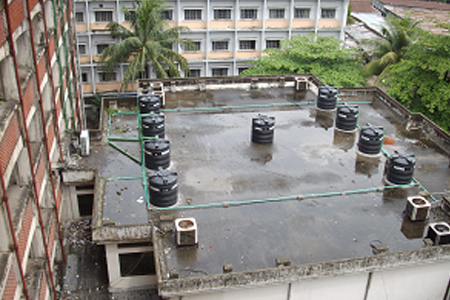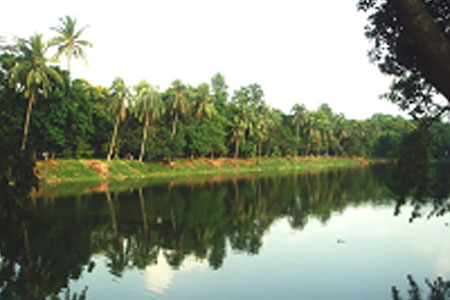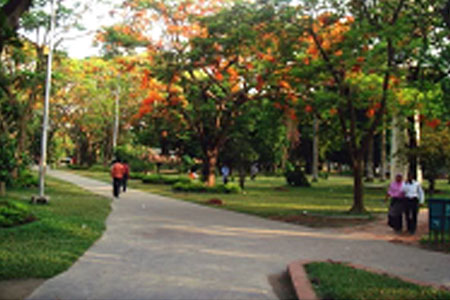-
Environment and PWD
Environmental concerns like climate change, deforestation, water scarcity, decreasing biodiversity and soil erosion are the realities of the present world and Bangladesh is no exception to that. This calls for extreme care to be taken to protect the interest of our future generation. As mentioned by the United Nations through MDG 7 ensuring environmental sustainability, it is our global responsibility "to promote harmony with nature and the Earth to achieve a just balance among the economic, social and environmental needs of present and future generations of humanity." In line with this and in compliance with the policies, rules and regulations of the government of Bangladesh, PWD puts special care in preservation and restoration of natural environment in planning and implementation of all its development programs.
During the development process, there is always disruption to the natural environment. If planned and constructed properly, the built environment can blend seamlessly with the natural environment, one enhancing the other. Therefore, PWD carefully considers the loss of water bodies, damage to ecologically critical areas, damage to natural forest, loss of top soil and agricultural land in planning and implementation of development projects. Special emphasis is given to planting of trees in all project areas and construction and conservation of lakes and ponds. Priority is also given to the preservation of buildings and monuments, structures of architectural value and preservation of special natural features. Beside these, incorporation of waste management system and supply of potable water to the occupants of the buildings is also carefully planned and implemented. PWD takes all measures to protect government interests regarding the environment by taking the following steps:
- To integrate environmental considerations into housing and urban planning activities.
- To gradually extend environmentally sound amenities to all existing urban and rural housing areas.
- To monitor and control housing and urban development schemes that may have an adverse impact on the local and overall natural environment.
- To accord greater importance to water bodies for their part in maintaining ecological balance and beautifying urban areas.
- To raise awareness on environmental issues and capacity building of human resources to facilitate adaptation to climate change by organizing training courses, seminars and workshops.
Combating Climate change and Green Building DesignResearch from several sources indicates that Bangladesh is going to be one of the most severely affected countries due to the effect of climate change. It is feared that the frequency and intensity of extreme events like flood and higher category cyclone would be increased. Buildings consume significant amount of the world's total energy. However, the sector has immense potential for delivering significant and cost-effective Green House Gas (GHG) emission reductions. It is the demand of time that planning and design of building should be undertaken considering its impact on the environment and efforts should be given to find out more sustainable building materials and construction practices. Initiatives like selection of appropriate construction materials, use of energy efficient electrical appliances, water efficient fixtures, reuse and recycling of waste water, use of rain water and solar power play important role in this regard. PWD is keen to incorporate these features gradually in the public buildings of Bangladesh. Incorporating various green features in buildings in line with the government policy is already being practiced. Installation of solar panel and rainwater harvesting system in many public buildings are example of such initiatives. A manual for installation and operation of rain water harvesting system has already been developed.

Rain Water Harvesting System at PWD HQParks and LakesThe responsibility of maintenance of important Parks and Lakes lies with PWD. Standing at the heart of Dhaka City, a dedicated office of PWD is working round the clock to maintain the natural beauty of Ramna Park which is the home of hundreds and thousands of different flora and fauna. The Sohrowardi Uddyan is another historic park in Dhaka which is maintained by PWD.

Lake at Ramna Park
Ramna ParkEnvironment and Health sector and role of PWD:Public Works Department is responsible for construction and maintenance of large health care facilities in the country including all specialized hospitals. Hospitals are large public buildings that have a significant impact on the environment and economy of the surrounding community. They are heavy users of energy and water and produce large amounts of waste. PWD is actively involved in providing the basic infrastructure for proper waste management in the public hospitals.
Area to be addressedFollowing are some of the areas which are under active consideration of PWD to protect environmental degradation.
- Preparation of an environmental guide line to be followed during the planning stage of a scheme.
- Preparation of an environmental guide line for the contractors which would be part of the tender document and ultimately part of the contract to be followed during construction work.
- Preparation of environmental management guide lines during operation and maintenance of important sectors like health, homes etc.
- Assessment of environment friendliness of construction materials.
- Preparation of a guide line for Green Building Design for Bangladesh context in light with such guide lines prepared by many other countries like Green Building Council of Australia, LEEDS of USA, BREAMS of UK etc.
- Advocating in favor of introducing green star rating of building in Bangladesh like many other countries in the world.
- Identification and promotion of green features in building to combat the effect of climate change.